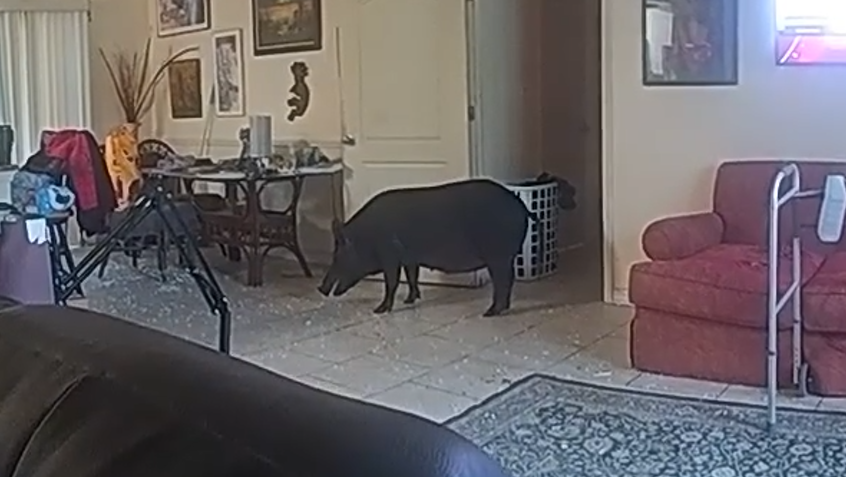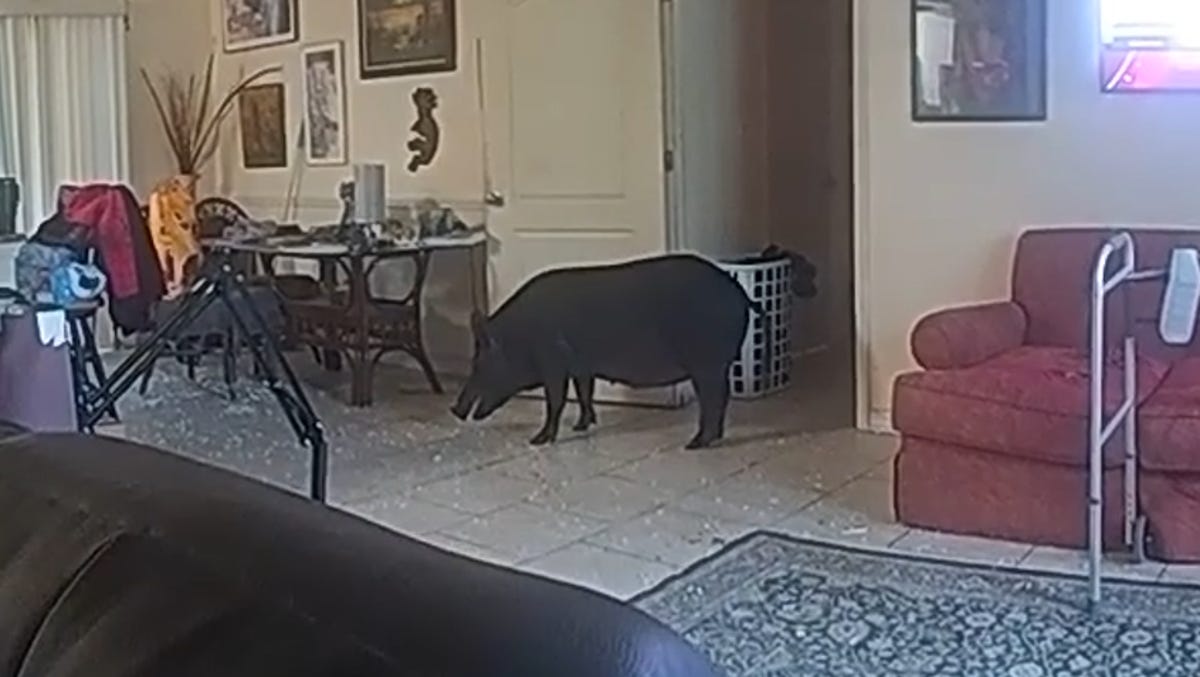
Wild hog busts through glass door into Florida home, battles cops
A feral hog burst through a glass door into a Lehigh Acres home. After a wild showdown, Lee County deputies chased the swine into the woods.
A large wild hog broke into a Lehigh Acres, Florida, home through a sliding glass door.Bodycam footage shows deputies chasing the aggressive animal out of the house and into the woods.
“Geeeeeeosh!”
That was the reaction of a Lee County deputy upon entering a Lehigh Acres, Florida home after a large wild hog had burst through the sliding glass back door and was seen standing in the living room.
“Right? That’s a big, mean, feral animal,” a female resident of the home can be heard saying on the deputy’s body camera footage.
“It’s like a 300-pound sow,” the deputy says in a radio transmission, while the sow stood motionless. But not for long.
Bodycam footage shows a deputy looking at the broken glass door when the hog, chased by a second deputy, charges out of the home.
Attempts to reason with the feral pig fell on deaf ears.
“Easy, easy,” the deputy outside the home says as the hog charges toward him and appears to attempt to bite him. “You better stop it!”
The pig did not stop it, but instead made several more passes, each time charging at the deputies.
Attempts to wrangle the aggressive animal using rope also failed, but in the end, the deputies came out on top and chased the hog into the woods, with all involved apparently uninjured.
Wild hogs in Florida
While not native to Florida, populations of wild hogs, also called feral hog, feral swine, feral pig, wild boar, wild pig or piney woods rooter, have existed here for hundreds of years. It’s suspected they were introduced by Spanish explorer Hernando DeSoto as early as 1539.
According to Florida Fish and Wildlife, wild hogs live in all 67 Florida counties. They’re found in a wide variety of habitats but prefer oak-cabbage palm hammocks, freshwater marshes and sloughs, pine flatwoods, and more open agricultural areas.
They travel in small groups or alone.
Wild hogs can reach weights of more than 150 pounds and measure 5 to 6 feet long.
Per FWC, wild hogs eat a variety of plants and animals and feed by rooting with their broad snouts. They may disturb the soil and ground cover vegetation and leave the area looking like it has been plowed.
Feral hogs can carry disease
Per FWC, feral hogs are carriers of:
Pseudorabies: Pseudorabies is a contagious infectious disease of swine caused by pseudorabies virus (PRV), a herpesvirus. Feral hogs are the main reservoir of PRV in the United States. Dogs exposed to feral hogs are at risk for pseudorabies. The disease is not a threat to humans, but it is always fatal in dogs.Swine Brucellosis: People can be infected with brucellosis bacteria when blood, fluid or tissue from an infected animal comes in contact with their eyes, nose, mouth or skin. FWC encourages people to take precautions when dressing and handling harvested wild hogs and to cook meat thoroughly.How to keep wild hogs away from your home
Trying to keep wild hogs from your property can be difficult, but adequate fencing should keep them out of small yards and gardens. To avoid conflict with wild hogs, FWC recommends the following:
Motion-activated lights or alarms are typically unsuccessful but can provide temporary results.Electric fencing can keep hogs out of small yards and gardens. Place electric fence on your property with at least two strands that total 2-3 feet in height.Hog panel fencing between 24 and 32 inches tall is effective but may be costly to install and maintainHunting wild hogs in Florida
According to FWC, wild hogs may be trapped and hunted year-round with landowner permission. A hunting license is not required, and a permit is not required to take wild hogs at night with a gun and light with landowner permission.
Hunters may use dogs and any legal rifle, shotgun, crossbow, bow, pistol or air gun (including airbow). There is no size or bag limit, and either sex may be harvested.
Wild hogs may be trapped using live traps (e.g., box traps, cage traps, corral traps).
Additionally, FWC offers late spring and summer wild hog hunting opportunities on wildlife management areas across the state, some of which require a quota permit.
While a hunting license isn’t needed to hunt wild hogs at a wildlife management area, a management area permit is required.

